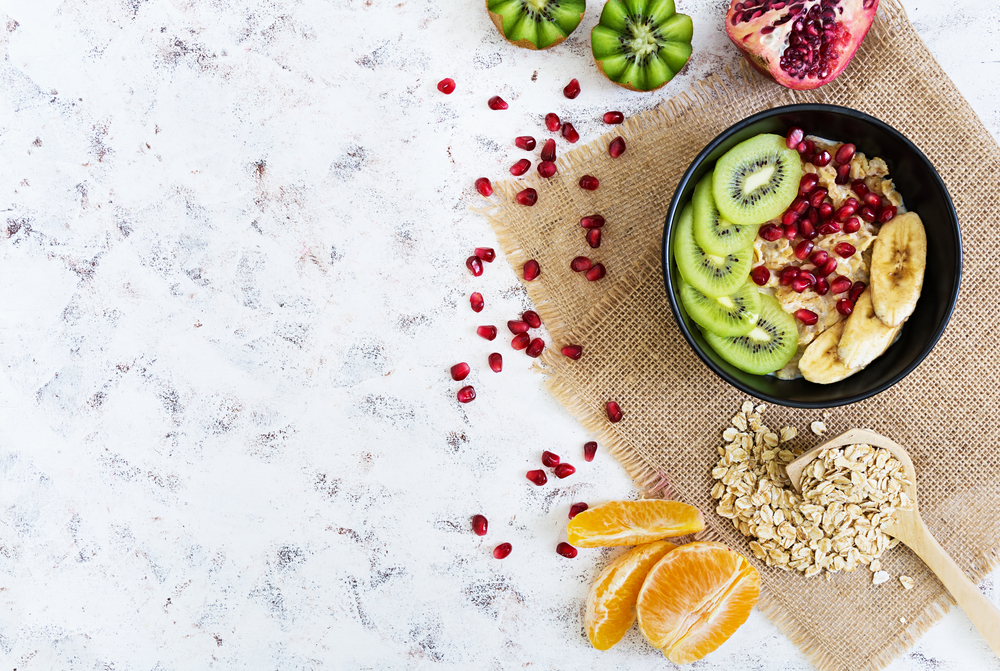
A registered dietitian can identify what your body needs most, but if that is not someone you have access to – following the guidelines below is a good starting point to begin revitalizing your body, brain chemistry and self-esteem with proper nutrition. And remember: You don’t have to overhaul your entire diet overnight. Start by simply being a bit more mindful about what you put in your body — for instance, skip processed convenience foods and fill your plate with lots of fruits and vegetables. Have fun by experimenting with different recipes or various ways to prepare foods you eat regularly. Here are more changes to consider making:
1. Stay hydrated. Your body needs regular hydration, so be sure to drink plenty of water. Women should aim for about 2.7 litres (91 ounces) of total water — from all beverages and foods (yep, foods have water too!) — every day, and men an average of approximately 3.7 litres (125 ounces daily) of total water, according to the Institute of Medicine.
Drinking water flushes out toxins and aids in overall digestion and healing.
2. Start your day right with a good breakfast. You need the fuel from food — not just a quick cup of coffee — to keep you going through the morning, and your brain functions better with a breakfast boost as well. The best breakfasts include a mix of protein, fibre and healthy fats – this combo will keep you full for at least three hours and prevent blood sugar dips that can affect mood. Try some eggs with sautéed spinach and a pear, or low-fat Greek yoghurt with a handful of nuts and a sliced banana.
3. Cut out the caffeine. Whether from coffee, tea, soda or even food (like chocolate), caffeine can exacerbate anxiety and insomnia, which are especially prevalent in early sobriety. Sleep troubles are common partly because addiction disrupts the body’s circadian rhythms, making it difficult to fall (or stay) asleep without your drug of choice.
If you find it impossible to completely cut out caffeine, limit intake to two beverages per day and neither too close to bedtime. (The effects of caffeine can last from eight to 14 hours.) Decaffeinated coffee is a better choice, but even decaf has a little caffeine.
4. Choose foods closest to nature. In other words, it’s better to eat an apple than to drink apple juice or eat applesauce, and it’s better to opt for a dry nut and fruit trail mix than an energy bar.
5. Read labels. Don’t worry about the calories and fat grams, but instead focus on the ingredients and minimize foods with a laundry list of items on the label (especially ingredients you don’t recognize or can’t pronounce).
6. Avoid sugary foods and refined carbohydrates. As mentioned above, it’s very common for those in recovery to turn to sugary, starchy foods to provide the rush and comfort that drugs or alcohol once provided. The result can be a “cross addiction,” or transfer addiction, in which a dependence on one substance is replaced with another.
Sugar functions much as a drug does, triggering the release of the feel-good brain chemical dopamine in the same area of the brain affected by cocaine and heroin. In fact, a much-publicized study in PLOS ONE showed that rats preferred sugar to cocaine.
Turning to healthy sugars (especially those found in fruit), “good” carbs (such as brown rice and quinoa) and protein (low-fat dairy, nuts, legumes) can help fight the siren song of pastries, cakes, candy and cookies.
Try satisfying combinations with a touch of sweet, such as apple slices and all natural almond butter, string cheese and a peach or low-fat Greek yoghurt mixed with berries and walnuts.
7. Eat antioxidant-rich foods. Fruits and vegetables are jam-packed with powerful antioxidants, making them a good choice for rebuilding a strong immune system during recovery. Add fresh fruit (consider apples, strawberries and blueberries) and raw or lightly-cooked vegetables (broccoli, peppers and carrots are vitamin-packed choices) to your daily diet.
As a bonus, these nutrient-dense foods help restore skin and hair, which often deteriorate when using alcohol or drugs.
8. Power your body with protein. When it comes to nurturing a recovering brain, protein is a key building block. Amino acids from proteins are used to make the neurotransmitters that allow your brain cells to network and communicate.
Heavy use of drugs or alcohol combined with a decrease in nutrients also lowers your liver’s ability to filter toxins. If your liver isn’t extremely damaged, quality protein in food can help it become more efficient. Just be sure to choose healthy, easy-to-digest protein sources like fish, poultry and beans.
9. Fill up with fibre. Since alcohol and drug abuse upset your digestive system – often causing diarrhoea, indigestion and constipation — adding fibre to your diet will go a long way toward helping your body recuperate. Fill up on fruits and vegetables and start replacing white flour foods (white pasta, rice and bread) with 100% whole grains (brown rice, quinoa, barley).
Foods like brown rice, black beans, artichokes, peas and pears will also provide valuable roughage for your system, which can improve elimination. Start slow and in small doses so your body adjusts to the additional fibre; for example, add a piece of fruit to your breakfast and then some vegetables to your snack. The next day, keep those foods in your diet and then add some beans to your salad at lunch.
10. Choose healthy fats. To assist in cellular repair and the absorption of vitamins and nutrients, it’s essential to consume an adequate amount of “good” fats. These include olive oil, flaxseed oil and omega-3s (found in fatty fish, nuts and flaxseeds).
11. Be a smart snacker. Eating regular, healthy snacks that contain some protein will help regulate your blood sugar, which keeps your mood stable. Light snacks might include hummus with carrot sticks or raw unsalted almonds and cashews.
Adding healthy eating to your addiction-fighting arsenal along with the therapeutic aspect can go a long way toward helping you make the right choices to stay sober.
If nothing else, a well-rounded diet will help you look and feel better — and being happier with the person you see in the mirror is no small thing.
The clearer eyes, hair and skin and heightened energy and mood that good food can bring are proof of progress and of your commitment to a better life.

